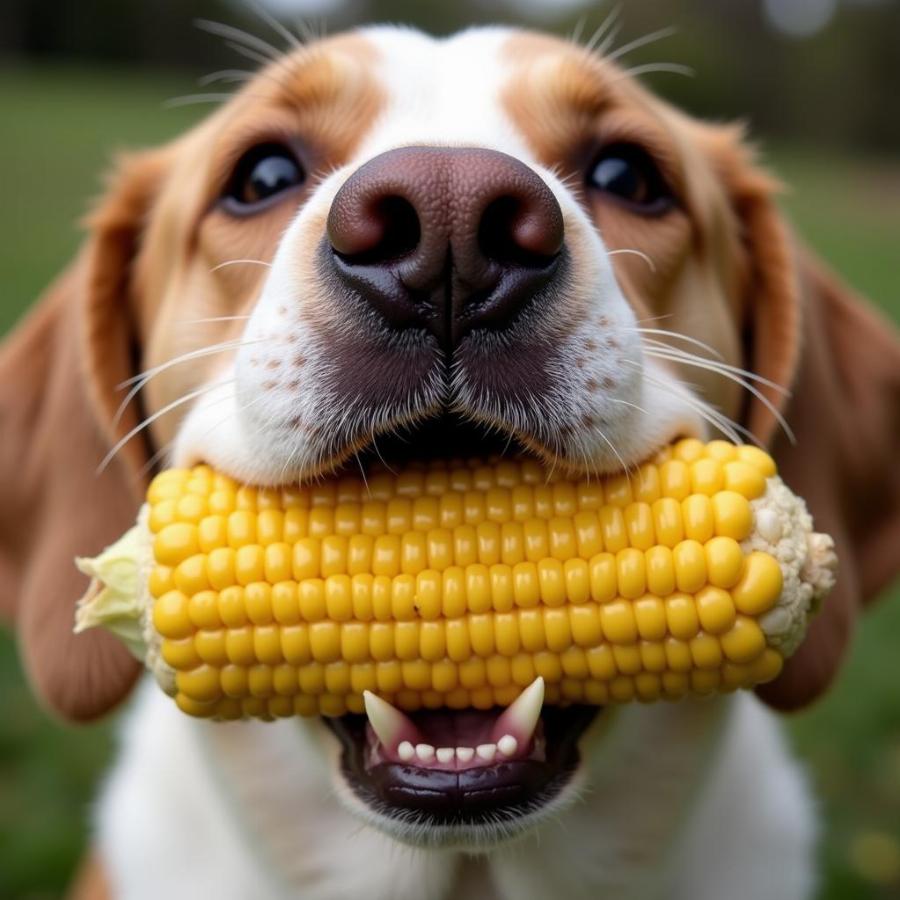Corn on the cob is a summertime staple for many families, and it’s tempting to share this tasty treat with our furry friends. But is corn on the cob actually safe for dogs? The short answer is no. While a few kernels of corn are generally harmless, corn on the cob itself presents a significant choking hazard and can cause intestinal blockage. Let’s delve deeper into why corn on the cob is bad for dogs and what safer alternatives you can offer.
Why is Corn on the Cob Dangerous for Dogs?
The main problem with corn on the cob isn’t the corn itself, but the cob. Dogs can’t digest the cob, and it’s extremely difficult for them to break down. If ingested, the cob can become lodged in the esophagus, stomach, or intestines, leading to serious health complications.
Choking Hazard and Intestinal Blockage
The size and shape of the cob make it a prime choking hazard, especially for smaller dogs. Even if a dog manages to swallow a piece of the cob, it can cause an intestinal blockage. This blockage can prevent food and water from passing through the digestive system, leading to vomiting, dehydration, abdominal pain, and potentially even death. Surgery is often required to remove the obstruction.
Other Potential Issues with Corn
While less serious than blockage, there are other potential issues associated with feeding corn to dogs. Corn is a common allergen for some dogs, and it can trigger reactions like itchy skin, digestive upset, and ear infections. Also, corn is high in carbohydrates, which can contribute to weight gain if fed in large quantities. Some commercial dog foods use corn as a filler ingredient, which provides minimal nutritional value.
 Dog Choking on Corn Cob
Dog Choking on Corn Cob
Can Dogs Eat Corn Off the Cob?
While the cob is dangerous, a few kernels of corn off the cob are generally safe for dogs. Plain, cooked corn can offer a small amount of vitamins and minerals, such as vitamin C and antioxidants. However, it’s important to feed corn in moderation as part of a balanced diet.
Healthy Alternatives to Corn on the Cob
If your dog enjoys the taste of corn, consider offering safer alternatives, such as:
- Cooked, cut-up corn kernels: Remove the kernels from the cob and cook them until soft. Offer a small amount as a treat.
- Green beans: A crunchy, low-calorie treat that provides vitamins and fiber.
- Carrots: Another crunchy, healthy option that’s rich in vitamins and minerals.
- Apples (without the core and seeds): A sweet and refreshing treat that’s packed with vitamins and antioxidants.
- Dog-specific treats: Choose treats made with wholesome ingredients and avoid those with artificial colors, flavors, and preservatives.
What to Do if Your Dog Eats Corn on the Cob
If you suspect your dog has eaten corn on the cob, contact your veterinarian immediately. Symptoms of intestinal blockage can include vomiting, diarrhea, loss of appetite, lethargy, and abdominal pain. Early intervention is crucial to prevent serious complications.
Signs of a Problem
Be vigilant for these signs if your dog has ingested corn on the cob:
- Choking or gagging: Immediate veterinary attention is required.
- Vomiting: This can be a sign of blockage or irritation.
- Diarrhea or constipation: Changes in bowel movements can indicate digestive issues.
- Loss of appetite or lethargy: These are general signs of illness.
- Abdominal pain or distension: If your dog’s abdomen appears swollen or tender, seek veterinary care.
Preventing Corn on the Cob Consumption
The best way to prevent problems is to keep corn on the cob out of your dog’s reach. Dispose of cobs securely in the trash and supervise your dog during barbecues and picnics. Educate family members and guests about the dangers of corn on the cob for dogs.
Conclusion
While a few kernels of corn are okay, corn on the cob is definitively bad for dogs. The cob presents a serious choking hazard and can cause life-threatening intestinal blockage. Opt for safer, healthier alternatives to keep your furry friend happy and healthy. Remember, prevention is key!
FAQ
- Can puppies eat corn on the cob? No, puppies are even more susceptible to choking hazards and blockages than adult dogs.
- Is canned corn safe for dogs? A small amount of plain, canned corn without added salt or sugar is generally safe, but it offers limited nutritional value.
- What are the symptoms of an intestinal blockage in dogs? Symptoms can include vomiting, diarrhea, loss of appetite, lethargy, and abdominal pain.
- What should I do if my dog swallows a piece of corn cob? Contact your veterinarian immediately.
- What are some good alternatives to corn for dogs? Green beans, carrots, apples (without core and seeds), and dog-specific treats are all good options.
- Can corn cause allergies in dogs? Yes, corn is a common allergen for some dogs.
- Is corn a good source of nutrition for dogs? Corn offers some vitamins and minerals, but it’s primarily a source of carbohydrates and isn’t essential for a dog’s diet.
Related Articles
- corn on the cob and dogs
- what other foods are dangerous for my dog
- creating a healthy dog diet
- emergency first aid for dogs
Beaut Dogs is your trusted source for all things related to dog care, providing reliable and in-depth information on breed characteristics, health, nutrition, and training. When you need support, contact us via Email: [email protected] to get detailed and accurate answers from Beaut Dogs. Visit Beaut Dogs today to explore the wonderful world of dogs and learn how to care for them best!